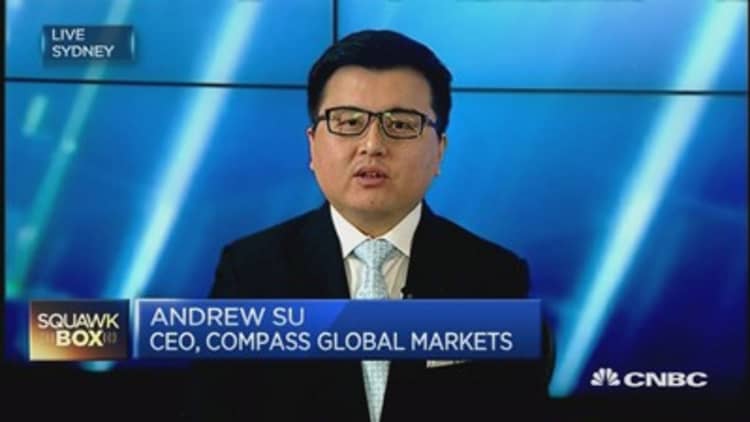Asian shares mostly fell on Monday, tracking the sell-off on Wall Street and as assurances from Chinese authorities failed to alleviate the wild swings in the country's equity markets.
Major U.S. indexes finished more than 1 percent lower last Friday, after the nonfarm payrolls report showed that 173,000 jobs were created in August, missing expectations of 220,000 and heightening uncertainty over the timing of a Federal Reserve rate rise.
The number had some analysts suggesting that the U.S. central bank might wait until later in the year to raise interest rates, but traders appear to be betting on a rate-rise at next week's Federal Open Market Committee (FOMC) meeting.
"Clarity is what the world wants and clarity was clearly what we didn't get in Friday's payrolls. The fact the two-year treasury yield was largely unchanged at 70 basis points highlights that the script didn't change," IG's chief market strategist Chris Weston wrote in a note on Monday.
U.S. stock markets will be closed Monday for the Labor Day holiday.
Mainland indexes volatile
China's share markets reopened to volatile trade after a four-day extended weekend, with the benchmark Shanghai Composite index closing down 2.55 percent at 3,079.7 after flip-flopping all day long between gains and losses.
Earlier in the session, the Shanghai bourse rose as much as 1.8 percent, helped by remarks over the weekend that aimed at calming the market, but the reprieve proved to be short-lived.
Among China's other indexes, the CSI300 index of the largest listed companies in Shanghai and Shenzhen closed down 3.4 percent, while the smaller Shenzhen Composite trimmed gains to 0.2 percent.
Read MoreThe week ahead: More bloodletting in China stocks?
Over the weekend, People's Bank of China (PBoC) Governor Zhou Xiaochuan said at the G-20 meeting in Turkey that after a bubble formed in the first half of the year.
Lorraine Tan, director of equity research in Asia at Morningstar, told CNBC that the remarks hinted at the possibility of further stimulus measures to come in China.
"Most governments around the world can't predict stock markets so I don't expect to really know that. What I will find confidence is expectation that there will be more stimulus coming through. The slowdown in China is real and it is starting to affect the consumption sector so once that happens, we expect to see more policy moves going forward," said Tan, who is expecting stimulus in the form of interest rate and income tax cuts.
Meanwhile, the China Securities Regulatory Commission (CSRC) said in a post on its Weibo account late Sunday that stock markets were more stable, adding that risks associated with high levels of leverage have eased following a period of high volatility.
In other news, China's National Bureau of Statistics on Monday revised down 2014 gross domestic product (GDP) growth to 7.3 percent from a previously reported 7.4 percent.
Read MoreChina poses 'biggest risk' to global businesses
Nikkei gains 0.4%
Japan's Nikkei 225 index inched back up into positive territory, finishing well off its intra-day low of 17,478.7 after a volatile day.
"Japan is taking the lead from China [amid] concerns that share price declines could spill over to China's economy. With Japan being a cyclical market by nature, it has become sensitive to what's happening in China," Amir Anvarzadeh, director of Japan equity sales at BGC Securities (Singapore), told CNBC's "Street Signs Asia."
Toshiba charged up 1.8 percent despite delivering a net loss of 37.8 billion yen for the last fiscal year in the wake of an accounting probe. Earlier at the open, shares of the troubled conglomerate fell more than 2 percent to hit its lowest level since January 2013.
Nippon Kayaku toped the leaderboard with a rise of 12.1 percent, lifted by a Nikkei business daily report that the drug maker could seek government approval for new cancer treatment by next Spring.
Office equipment maker Ricoh climbed 9.3 percent after Singapore-based Effissimo Capital Management became the company's top shareholder following the purchase of a 8.6 percent stake.
However, a near 2 percent slump in index heavyweight SoftBank weighed down the bourse. Brokerage house Nomura Holdings eased 0.6 percent, while Daiwa Securities closed down 1.1 percent.

ASX slips 0.2%
Australia's S&P ASX 200 index tracked the risk-off sentiment in offshore markets to end Monday lower.
Within the resources sector, market bellwether BHP Billiton tanked 2 percent, while oil producer Santos led losses within the sector with a 4.3 percent plunge as crude oil extended losses on the back of lingering supply glut woes.
Financials were mostly southbound, with Westpac retreating 0.5 percent after the lender said it would increase annual investment spending by 20 percent as it looked to focus on customer service and improved efficiency. Australia and New Zealand Banking and National Australia Bank also closed down 0.6 percent each.
Bucking the downtrend, Starpharma Holdings soared 21.3 percent after the products developer signed a licensing agreement with AstraZeneca. Mineral explorer TNG also climbed 18.4 percent on the back of a new deal with Korean Woojin Co.
In the currency space, the Australian dollar hovered near a six-year low of $0.6934 against the U.S. dollar amid worries over global growth.
However, Andrew Su, CEO of Compass Global Markets, told CNBC that he expects the local currency to stage a rebound soon.
"[Recent declines have] been an overreaction to what's happening in China," Su told CNBC Asia's "Squawk Box." "The PBOC over the weekend made strong statements about the end of volatility in Chinese equity markets and the yuan coming back to equilibrium so I see the Australian dollar bouncing back strongly... it wouldn't be a surprise if it surges toward 75 U.S. cents in the next few weeks."

Kospi sheds 0.2%
South Korean shares weren't spared from the choppy trade evident region-wide; the key Kospi index turned negative late in the session to finish at 1,883.2 — 12 points away from the day's low of 1,870.5, which was the index's weakest level in nearly two weeks.
Among the index heavyweights, Samsung Electronics sold off 1.5 percent, while Posco and KB Financial Group lost more than 1 percent each.
Weak oil prices put a chokehold on energy producers, with SK Innovation and S-Oil closing down 1.7 percent each.
Shares of Hyundai Motor and Kia Motors rose 1.3 and 1.7 percent respectively, shrugging off news from the weekend that South Korea's automobile exports shrank for the second month in a row in August, due to unfavorable exchange rates and a slowdown in emerging markets.
Read More'Thaksinomics' returns as Thai junta rethinks revival strategy
Emerging Asia eyed
Equity markets in Malaysia and Indonesia fell 0.6 and 2.2 percent respectively to their lowest levels in more than a week, while both currencies crashed to fresh 17-year lows on Monday.
The Malaysian ringgit lost 1 percent of its value against the U.S. dollar to trade at 4.3010, while the Indonesian rupiah tumbled 0.5 percent to fetch 14,230 versus the greenback amid speculation of an interest-rate rise in the U.S. next week.

